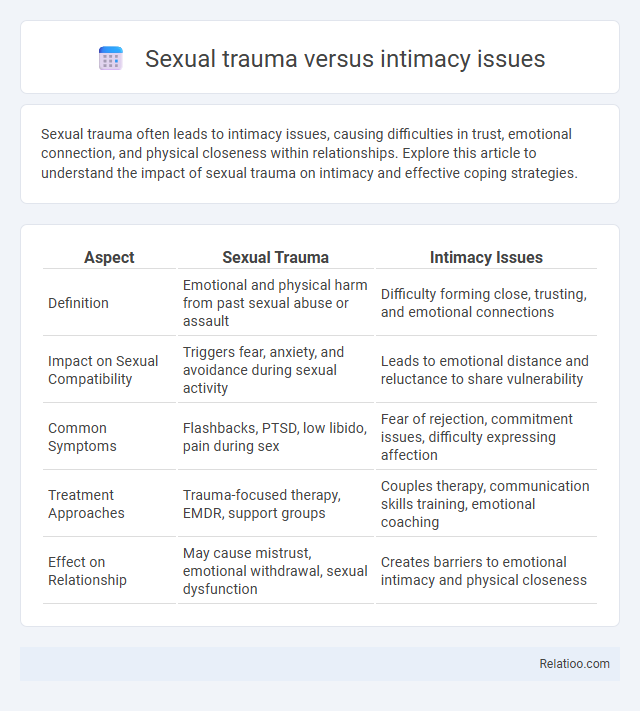Sexual trauma often leads to intimacy issues, causing difficulties in trust, emotional connection, and physical closeness within relationships. Explore this article to understand the impact of sexual trauma on intimacy and effective coping strategies.
Table of Comparison
| Aspect | Sexual Trauma | Intimacy Issues |
|---|---|---|
| Definition | Emotional and physical harm from past sexual abuse or assault | Difficulty forming close, trusting, and emotional connections |
| Impact on Sexual Compatibility | Triggers fear, anxiety, and avoidance during sexual activity | Leads to emotional distance and reluctance to share vulnerability |
| Common Symptoms | Flashbacks, PTSD, low libido, pain during sex | Fear of rejection, commitment issues, difficulty expressing affection |
| Treatment Approaches | Trauma-focused therapy, EMDR, support groups | Couples therapy, communication skills training, emotional coaching |
| Effect on Relationship | May cause mistrust, emotional withdrawal, sexual dysfunction | Creates barriers to emotional intimacy and physical closeness |
Understanding Sexual Trauma: Definitions and Impact
Sexual trauma refers to the experience of sexual violence or abuse, which often leads to profound psychological and emotional consequences affecting an individual's ability to form trusting, intimate relationships. Intimacy issues frequently arise as a direct impact of sexual trauma, manifesting as difficulties with closeness, vulnerability, and sexual expression. Understanding sexual trauma involves recognizing its complex effects on mental health, including PTSD, anxiety, and disrupted attachment patterns that interfere with healthy intimacy.
What Are Intimacy Issues? Signs and Symptoms
Intimacy issues manifest as difficulty in forming close emotional or physical connections, often marked by fear of vulnerability, trust problems, or withdrawal from affection. Signs include avoidance of closeness, anxiety during physical contact, and emotional detachment, which can stem from unresolved sexual trauma. Your ability to build healthy relationships may be impacted if these symptoms hinder genuine emotional bonding and mutual comfort.
Core Differences Between Sexual Trauma and Intimacy Issues
Sexual trauma involves experiencing or witnessing a harmful sexual event that can lead to severe psychological distress, while intimacy issues refer to difficulties in forming close, trusting emotional or physical relationships without necessarily having a traumatic origin. Core differences include that sexual trauma often results in PTSD, anxiety, or flashbacks directly linked to the trauma, whereas intimacy issues may stem from attachment problems, fear of vulnerability, or low self-esteem without traumatic exposure. Treatment approaches diverge as sexual trauma requires trauma-focused therapies like EMDR or cognitive processing therapy, whereas intimacy issues often benefit from relational or attachment-based counseling.
How Sexual Trauma Influences Intimate Relationships
Sexual trauma profoundly impacts intimate relationships by causing trust issues, emotional detachment, and difficulty with physical closeness. Survivors often experience heightened anxiety and flashbacks during intimacy, which can lead to avoidance or conflict with partners. Healing efforts that include trauma-informed therapy can help rebuild trust and foster healthier emotional and physical connections.
Identifying the Roots: Trauma vs. Emotional Barriers
Sexual trauma often manifests through deeply ingrained emotional barriers that hinder intimacy, requiring careful identification to distinguish between trauma-related symptoms and general intimacy issues. Emotional barriers stemming from past abuse differ from intimacy problems caused by fear of vulnerability or communication gaps, emphasizing the need for trauma-informed therapeutic approaches. Recognizing the roots of sexual trauma versus intimacy challenges involves evaluating psychological impact, attachment history, and physiological responses to effectively tailor healing strategies.
Psychological Effects: Comparing Trauma and Intimacy Challenges
Sexual trauma often leads to profound psychological effects such as PTSD, anxiety, and depression, which can significantly impair your ability to form and maintain intimate relationships. Intimacy issues, while also rooted in psychological discomfort, typically arise from fears of vulnerability, attachment difficulties, or past emotional wounds rather than direct traumatic experiences. Understanding the distinct psychological impacts of sexual trauma versus general intimacy challenges is essential for targeted therapeutic interventions and healing.
Coping Mechanisms and Healing Strategies
Coping mechanisms for sexual trauma often include therapy approaches such as cognitive-behavioral therapy (CBT) and eye movement desensitization and reprocessing (EMDR) to address PTSD symptoms and rebuild trust in intimacy. Healing strategies for intimacy issues resulting from sexual trauma emphasize creating safe environments, open communication with partners, and gradual exposure to physical affection to diminish anxiety and improve emotional connection. Emphasizing self-care practices like mindfulness, support groups, and trauma-informed care can significantly enhance recovery by empowering survivors to regain control and foster healthy sexual relationships.
Seeking Support: Therapy Options for Trauma and Intimacy Issues
Seeking support for sexual trauma and intimacy issues involves specialized therapy options such as trauma-focused cognitive behavioral therapy (TF-CBT) and Eye Movement Desensitization and Reprocessing (EMDR), which address the emotional and psychological impact of trauma. Couples therapy and sex therapy provide effective interventions for improving communication, rebuilding trust, and enhancing intimacy after trauma. Accessing support from licensed mental health professionals trained in trauma and relational dynamics is crucial for tailored treatment and recovery.
Building Trust After Sexual Trauma
Building trust after sexual trauma requires consistent, patient communication and setting clear, respectful boundaries to create a safe emotional environment. Intimacy issues often stem from fear, anxiety, or hypervigilance triggered by trauma, making gradual exposure and validation essential in therapy. Specialized trauma-informed approaches such as EMDR or cognitive-behavioral therapy help survivors rebuild trust and foster healthy intimate relationships.
Steps Toward Reclaiming Healthy Intimacy
Sexual trauma often leads to intimacy issues, creating barriers that affect your ability to connect and trust in relationships. Healing requires recognizing trauma's impact on emotional and physical boundaries, followed by therapy focused on rebuilding safety and communication. Steps toward reclaiming healthy intimacy involve developing self-compassion, setting clear boundaries, and gradually reestablishing trust through supportive and empathetic connections.

Infographic: Sexual trauma vs intimacy issues
 relatioo.com
relatioo.com